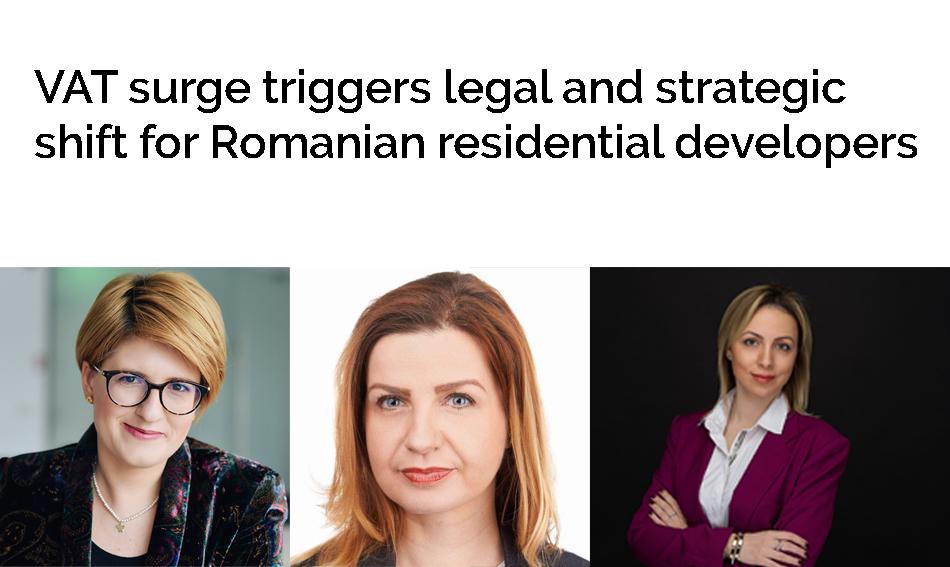2025-07-28
finance

With Romania’s residential real estate sector on edge ahead of the August 1, 2025 VAT increase—raising the reduced 9% rate to the new standard rate of 21%, raised from 19% —developers are facing a wave of legal, financial, and operational challenges. As buyers rush to sign preliminary agreements to secure lower tax rates, the market is being reshaped by heightened uncertainty, potential disputes, and the need for rapid adaptation. CIJ EUROPE gathered insights from leading legal experts to assess how developers are navigating this volatile environment. Siranuș Hahamian, Partner and Head of Real Estate & Construction at Ijdelea & Associates, observes that fiscal unpredictability is undermining what had been a stabilizing market. As buyers hasten to sign preliminary contracts to benefit from the existing reduced VAT rate, developers are increasingly exposed to legal risks. Chief among these are disputes over whether signed agreements entitle buyers to the lower VAT rate, especially in cases where the advance payment requirements are not strictly followed or where the delivery of the property falls after the rate change. Contractual ambiguity, particularly regarding who bears fiscal risk, is a recurring issue. Delays in handovers could lead to breach claims or calls for compensation, and hurried negotiations might expose developers to accusations of misrepresentation or insufficient disclosure. Irina Dimitriu, Partner at Reff & Associates | Deloitte Legal and Real Estate Industry Leader at Deloitte Romania, adds that some developers may have promised delivery timelines they cannot realistically meet, which could further expose them to buyer demands to absorb the VAT difference. Many buyers will argue that the agreed prices were VAT-inclusive at the previous rate. Dimitriu emphasizes the importance of revising contracts to clearly state whether prices are VAT-inclusive and to allocate the burden of tax changes in a transparent and legally defensible way. Without such clarity, she warns, developers could face buyers seeking to terminate agreements, demand refunds, or challenge enforcement of penalty clauses. Roxana Catea, Of Counsel at Stratulat Albulescu Attorneys (SAA), points out that under the revised Fiscal Code, VAT is determined not by the contract date but by the delivery date. As a result, developers may face lawsuits from buyers who signed preliminary agreements before August but receive delivery afterward. She recommends that contracts explicitly define net and gross sale prices, indicate applicable VAT rates, and clearly assign responsibility for any VAT changes. Furthermore, she cautions that buyers may attempt to invoke the civil code’s hardship doctrine to modify or exit contracts, claiming the VAT increase was unforeseeable. To counter this, developers should insert clauses stating that such fiscal changes are anticipated and that hardship provisions do not apply. Beyond contract law, consumer protection issues are also expected to arise. Catea notes that some buyers could allege deceptive marketing, especially if developers used aggressive or misleading promotional materials to accelerate sales before the tax hike. This could expose developers to administrative sanctions as well as reputational harm. She urges thorough legal vetting of all public communications. From a financing perspective, the situation is equally fraught. The VAT increase could inflate total project costs, requiring developers to amend financing agreements and secure additional funding. Hahamian warns that financial forecasts and buyer commitment levels may become unreliable, increasing the risk of disputes with lenders. Dimitriu explains that if clients exit binding agreements, developers may breach their loan covenants and fail to draw down committed funds, pushing projects toward default. Lenders may demand reappraisals, more equity, or longer grace periods as a condition of continued support. Manuela Iurascu, Partner at Stratulat Albulescu Attorneys (SAA), predicts a temporary slowdown in new residential developments as stakeholders wait to assess the full impact of the VAT change. She expects developers to reassess pricing, sales strategies, and feasibility before launching or continuing projects. For banks, higher VAT may justify the tightening of covenants, particularly if expected cash flows decline or advance payments are reduced. The higher rate also exposes developers to increased inventory risk and longer sales cycles, particularly in price-sensitive segments of the market. On the compliance front, tax authorities are likely to closely inspect transactions near the transition date. Both Dimitriu and Iurascu highlight the importance of properly dated contracts, accurate invoicing, and thorough documentation to avoid accusations of tax avoidance or improper VAT application. Developers must implement internal systems that correctly match VAT rates with delivery dates and should be prepared for extensive audits. In response to these challenges, developers are being forced to rethink their contracts and business models. Hahamian sees the need for clearer clauses governing VAT, including mechanisms for price adjustments during transitional periods. Advance payment structures may also be revised to reduce late-stage exposure to tax rate shifts. Dimitriu recommends removing boilerplate VAT language and instead including explicit terms on price inclusivity and fiscal risk allocation. She suggests treating VAT changes as special events within sale agreements, requiring tailored legal responses. Iurascu foresees a broader strategic pivot. Some developers may shift toward higher-end or mixed-use residential products, where price sensitivity to VAT increases is lower. Others might explore build-to-rent models, especially in cities with strong rental demand like university hubs. Developers could also introduce early-bird pricing or promotional discounts to soften the blow of higher taxes and stimulate demand. Financing structures may be adjusted to secure larger upfront payments and reduce cash flow vulnerabilities. Across the board, legal experts agree that the VAT increase represents more than just a tax policy change—it is a stress test for the entire residential real estate sector in Romania. Contracts must become more sophisticated, compliance more rigorous, and business models more agile. Failure to adapt could result in litigation, financial distress, or reputational damage. As the deadline approaches, one thing is clear: for Romanian developers, legal precision and commercial flexibility are no longer optional—they are critical to survival. © 2025 www.cijeurope.com

